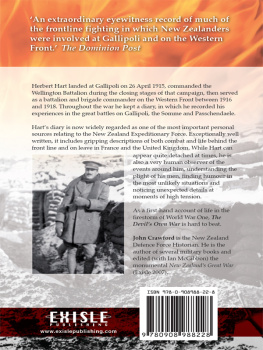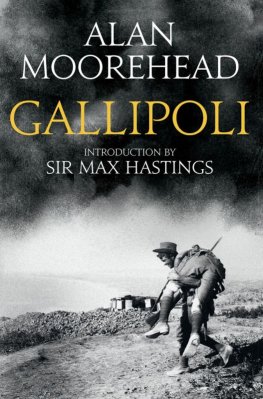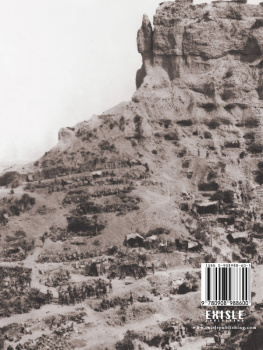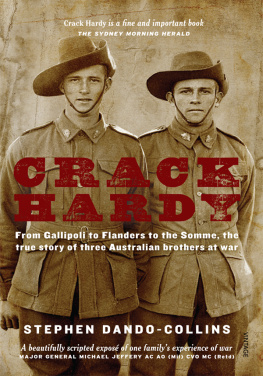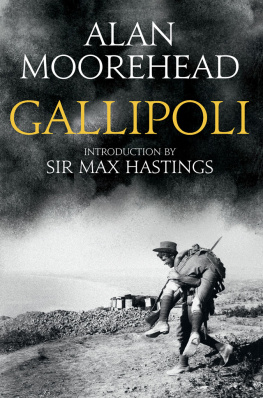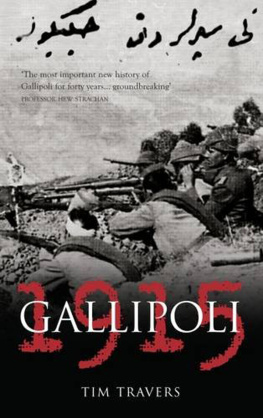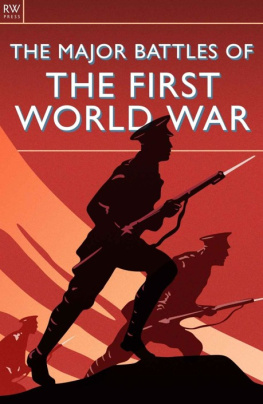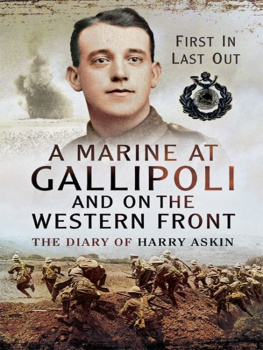THE
DEVILS
OWN WAR
THE DIARY OF
HERBERT HART
EDITED BY JOHN CRAWFORD

in association with the New Zealand Defence Force
MAPS
The maps in this book have been sourced from the following publications:
Page 104: The New Zealand Division 1916-1919, a Popular History Based on Official Records, by Hugh Stewart.
Pages 112, 136, 198, 202 and 246: The History of the Canterbury Regiment, NZEF: 1914-1919, by David Ferguson.
Page 140: The Official History of the New Zealand Rifle Brigade, by W.S. Austin.
FOREWORD
It is now 90 years since the armistice on the 11th hour of the 11th of November 1918 ended fighting in the First World War. This terrible conflict had wide ranging effects on the development of our nation, many of which are still to be properly explored. Yet sadly, as the years have marched irrevocably on, there have become fewer and fewer opportunities to probe the first-hand experiences and accounts of those who were involved in the war to end all wars. The New Zealand Defence Force is therefore delighted to bring to publication The Devils Own War: The First World War Diary of Brigadier-General Herbert Hart to mark the 90th anniversary of the armistice. Not only does it commemorate the achievements and sacrifices of New Zealand men and women in the First World War, but it also opens an important window in time for those interested in the period today.
This edition of Herbert Harts First World War diary sheds light on the career and personality of a remarkable citizen soldier. Before the outbreak of the war, Carterton lawyer Herbert Hart, like many other New Zealanders, chose to serve his country in the New Zealand Territorial Force. In August 1914, he volunteered for the New Zealand Expeditionary Force. Hart left New Zealand in 1914 as a major and returned to his home in April 1919 as a brigadier-general with an exceptional record as a battalion and brigade commander. He was, without doubt, one of the outstanding figures in the NZEF and was widely admired and respected by his fellow officers and soldiers alike.
Only a few diaries kept by battalion and brigade commanders during the Great War have been published, and the insights in The Devils Own War make it a significant contribution to the New Zealand historiography of World War One. I am sure that members of the New Zealand Defence Force will find much of value and interest as many of the attributes that made Hart a successful commander, such as his ability to quickly appraise a situation and act decisively to achieve an objective, remain as relevant today as they were 90 years ago.
Yet beyond these historical imperatives, publishing Harts war diary also serves another purpose. Harts detached descriptions of life in the frontline make compelling and sometimes surprising reading. For example, in the midst of the destruction and chaos of the trenches Hart is able to marvel at the spectacle of fireworks delivered by a direct hit by German artillery on a nearby ammunition dump. His descriptions of the daily routine of a hospital ward, where he is invalided after a gas attack leaves him blinded, reveal his deeply curious nature, as well as his wonderfully dry sense of humour. There are also the occasions where not even Harts detached perspective can protect him from the intrusion of the reality of his situation. There are deeply moving diary entries where, for example, Hart is drawn to pen angry outbursts at the death in combat of close friends. The juxtaposition of these diary styles paints a revealing and very human picture of the psychological stresses faced by Hart and all those who served alongside him in battle.
This book will undoubtedly help New Zealanders of the 21st century better understand what it was like to be a New Zealand soldier in the First World War. I commend it to you.
J. Mateparae
Lieutenant General
Chief of Defence Force
June 2008
ACKNOWLEDGEMENTS
The assistance and support provided by the Hart family made a major contribution to the successful completion of this edition of Brigadier-General Sir Herbert Harts First World War diaries. In particular, I am indebted to Merrilynn Bartram, Susan Peers, Ian Renall and Jill Wilson for their assistance. I would also like to acknowledge the important work done by the late Bettina Paine, Herbert and Minnie Harts youngest child, in gathering and then depositing in appropriate archives a great deal of significant material relating to her father. Richard Hurn kindly let me use his material about his uncle, Alexander McColl, and Margaret Christensen provided valuable information about her father, John Bubbers. Elaine Cairns did a fine job of transcribing shorthand passages in Harts South African War diary, and Ewan Hyde assisted by putting me in touch with members of the Hart family.
The Chief of Defence Force, Lieutenant General Jerry Mateparae, has strongly supported the publication of the Hart diaries, and appreciated how the project would help suitably to commemorate the 90th anniversary of the armistice that ended the Great War on 11 November 1918. My colleagues at the New Zealand Defence Force could not have been more helpful: I would especially like to acknowledge the assistance I received from Mary Slatter and the rest of the staff at the Defence Library, and from Melissa Ford, Mata Parakoti, Bradley Stead and Andy Deere.
The following institutions and their staff assisted with my work on this book: Alexander Turnbull Library; Kippenberger Military Archive and Research Library [KMARL], Queen Elizabeth II Army Memorial Museum; Archives New Zealand; Auckland War Memorial Museum; and the Wairarapa Archive. In particular, I would like to thank Dolores Ho, the KMARL Archivist; John Sullivan and others at the Alexander Turnbull Library; and Gareth Winter and his team at the Wairarapa Archive for their assistance.
Christopher Clayton, Peter Cooke, Zane Kidd and Ian McGibbon assisted me by reading different parts of the text. I would also like to acknowledge the firstrate job Peter Cooke did in preparing the books index. Ian Watt and his team at Exisle Publishing worked very hard to produce a fine book.
Finally, I would like to thank my wife Elizabeth Thomas and my daughters Ursula and Zo for their assistance and forbearance.
John Crawford, April 2008
PREFACE
In 1914, like many other New Zealanders, Wairarapa lawyer Herbert Hart decided to keep a diary to record his experiences during the great adventure of the First World War. Harts war diary begins when he leaves his home town of Carterton in August 1914 as a major in the New Zealand Expeditionary Force (NZEF) and concludes in May 1919 when he returns home as a much decorated brigadier-general. Harts diary is particularly significant because he had what can be described as a good war. He began his service as the second-in-command of the Wellington Infantry Battalion, and commanded that battalion during the final stages of the Gallipoli campaign and on the Western Front during 1916. Then, from early 1917 until early 1919, Hart was mostly employed commanding various NZEF infantry brigades.
Only a few diaries by Allied battalion or brigade commanders have been published. Perhaps the best known is General Jacks Diary 191418: The Trench Diary of Brigadier-General J.L.Jack DSO, edited by John Terraine and first published in 1964. Because battalion and brigade commanders had a key role in directing operations, they could comment both on the grim realities of life and combat in the front line and on wider military issues. Hart was an intelligent and perceptive officer who was a good judge of men and events. Because of this, his diary has been widely used by New Zealand historians of the First World War, and the publication of an edition of the diary will make the views and experiences of one of New Zealands greatest citizen soldiers even more widely known.
Next page
